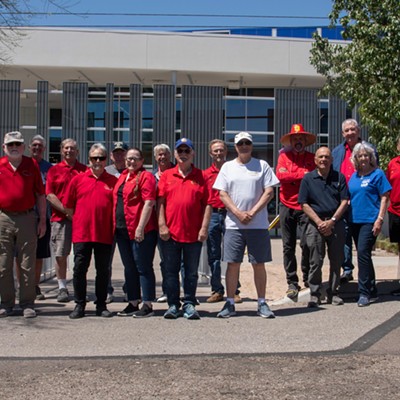Few things have dodged the budgetary ax this year, as conservative Republicans milk a rare opportunity to gut the social contract; everything from education to prenatal care has been on the block.
But somehow, one local welfare project seems to have avoided this fiscal bloodbath.
For nearly 15 years, Tucson Greyhound Park and other Arizona racing facilities have gotten an almost-free tax ride, thanks to the generous citizens of our fair state. This largesse dates back to 1994, when American Indian casino gaming began eating into profits at Arizona's dog and horse tracks. As a hedge against further losses, lawmakers created a tax exemption for simulcast-race wagering, allowed the tracks special deductions for capital improvements and instituted a "hardship tax credit," which often allows them to avoid paying any taxes at all.
Opponents of greyhound racing don't think these tracks deserve any breaks whatsoever—especially when crashing state tax revenues threaten vital services. "It's outrageous," says Joan Eidinger, publisher of the Phoenix-based Greyhound Network News. "We're closing schools, and the taxpayers are subsidizing this?"
According to the Arizona Department of Racing, in fiscal year 1995—the last year before the subsidies took effect—the state received nearly $9 million in revenues from horse and dog tracks. In 2008, because of the exemptions, that sum shrank to about $430,000. A 2007 review by the Arizona Office of the Auditor General revealed that exemptions and tax credits for the racing industry cost the state $44 million in revenues between 2001 and 2006.
In fiscal 2008, according to the Department of Racing, Tucson Greyhound Park pulled in a cool $16.2 million in wagers, and kept $3.4 million of that—while paying nothing in parimutuel betting taxes.
A call to park manager Tom Taylor for comment was not returned. But Susan Via has plenty to say about TGP's free ride. She heads Tucson Dog Protection, which last year spearheaded a South Tucson ordinance to improve the treatment of dogs kenneled at the park. Via says these tax credits and exemptions simply prop up a fading sport.
"If the voters are really concerned about raising adequate revenue for the state of Arizona, stop giving breaks to this industry," she says. "Make them pay their fare share on simulcasting. That's three-fourths of their revenue, and they pay zero taxes on it."
Simulcasting allows people to bet on races in places such as bars or other off-track venues.
Racing advocates argue that Arizona's tracks provide jobs. "But at what cost?" Via asks. "At what cost to the animals, and at what cost to the reputation of the state? And at what cost to the people? I'm not sure that encouraging more gambling is a great idea in a time of economic collapse and hardship. And I'm not sure that subsidizing a dying recreational industry is where Arizona wants to go."
So why do these special tax breaks endure? Simply put, political power. They were created with plenty of arm-twisting back in 1994, says Eidinger. "This legislation was passed at 2 o'clock in the morning on the last day of the legislative session." Leaders "wouldn't let anyone out of the room until they made a decision."
And it endures through power as well, she says, thanks in large part to intense, behind-the-scenes brokering by Phoenix attorney John Mangum. He represents Arizona's racing industry, and is known as one of the Capitol's hardest-driving lobbyists. "The gambling lobby is the most powerful lobbying group in both chambers of the Legislature," Eidinger says. "And Mangum is really tough."
Mangum didn't return several calls from the Tucson Weekly seeking comment. Nor were calls returned by House Speaker Kirk Adams or Senate President Bob Burns regarding the special tax breaks.
Meanwhile, the racing industry also leaves taxpayers to shoulder the lion's share of regulatory costs. The Arizona Department of Racing operates on a shoestring budget of just more than $3 million, and more than $2.6 million of that comes from the state's general fund. "The bottom line," says department director Luis Marquez, "is that the (hardship) tax credit affects general-fund revenues, which affects the state."
He says the credits haven't been specifically discussed at the Legislature in recent years. "But the department has made the argument that the industry needs to fund more of its own regulation. As part of those ideas, we have included alternatives that have something to do with the hardship tax credit. But it has never materialized on anything in the Legislature, or been discussed as part of any bill."
That may be about to change. Rep. Kyrsten Sinema of Phoenix, who serves as assistant leader to the Democratic caucus, recently got a peek at the numbers Eidinger had put together. "When I saw that, I thought, 'Holy cow!'" Sinema says. "This is an issue that has flown under the radar. And I think that's partly because it's an issue that's not well-understood. I'll be honest: When (Eidinger) talked to me about it, I had never heard of it before. But I think it's something that can be talked about in next year's budget."
And so Tucson Greyhound Park just keeps ambling along, making money but not paying the same taxes as other Arizona businesses. It's actually a nifty little cash cow—despite the protestations of its owners, Florida businessmen Joseph Zappala and Robert Consolo Jr. Speaking to the Tucson Citizen in 2000, Zappala described the park as "the worst investment we've ever made."
However, according to a 2007 audit, the partners had never filed individual Arizona income tax returns. Neither had their management company. But the pair did manage to pay themselves a management fee of $2.2 million—in addition to whatever profits the track made.
If that's a bad investment, we'd sure like to see a good one.









